Staff/Faculty
Much of our faculty and staff were first in their family to attend college too! It made quite an impact in their life to do so and they are here to encourage you that as a first gen student you got this! Click below to see their stories and how they want motivate you to keep going.
Kenia Reyes
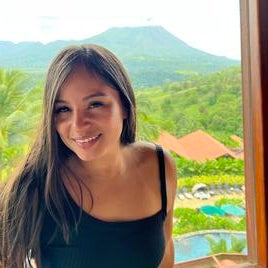
Education Innovation Specialist
As a part of our "Why I'm First" campaign, please share what it meant for you to be a First Generation college student?
Better opportunities of upward social mobility
What challenges did you face as a First Gen student and what programs/people helped you overcome them?
Not knowing a pathway l or having a guide. Creating community supported me into navigating college. This community building happened thanks to finding a job on campus, and being involved in cultural centers.
What UCR campus resources, programs or offices do you hope to see our First Gen students utilize?
Chicano student programs
Macy Jeffery Ring
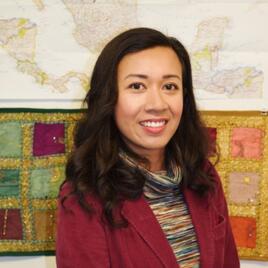
Program Manager, Capital Internships CUREL
As a part of our "Why I'm First" campaign, please share what it meant for you to be a First Generation college student?
Being a first gen student meant I was creating a path for myself and my family to lead a more fulfilling life. Earning a degree would open doors for me personally and professionally, which it certainly did! I explored my identity and life possibilities. I matured psychologically and behaviorally to juggle various life demands. I gained valuable career readiness skills through my first office job and internship on campus.
What challenges did you face as a First Gen student and what programs/people helped you overcome them?
Other than the challenge of being a low-income student, another major challenge was my parents believing college was not important. I regularly faced criticism and multiple requests to drop out of school in order to work full-time in a dead-end job. I only persisted through college because I did not want to end up like them: uneducated and poor. My campus advisors, peers, and work supervisors were all supportive and encouraging throughout my college years. These offices have changed since I graduated, they were the Women's Studies Department and International Services Center/Study Abroad office.
What UCR campus resources, programs or offices do you hope to see our First Gen students utilize?
I would say all of them, but the ones that come to mind are academic and college departments, faculty office hours, Center for Undergraduate Research & Engaged Learning, Academic Resource Center, Career Center, Financial Aid, and ethnic/gender offices.
Katie Smith Lopez
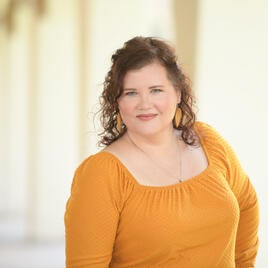
Lead Senior Advising Coordinator, CNAS UAAC
As a part of our "Why I'm First" campaign, please share what it meant for you to be a First Generation college student?
Neither of my parents had college degrees but they encouraged my brother and me to go to college and always spoke about it as if it were of course going to college. This normalized the idea and made us assume attending college was within our reach.
What challenges did you face as a First Gen student and what programs/people helped you overcome them?
I didn't know anything about the vast array of major and career possibilities beyond the "traditional" careers of teacher, lawyer, doctor, accountant. I ended up choosing a major that maybe wasn't the best fit for me, but I graduated with it. Eventually it opened doors for me to attend graduate school and gain experience to lead me to a career I love. My institution did not have very robust advising, so I had to do my best to navigate the systems without a lot of guidance. My parents were not able to assist with this at all either since they had not attended college. The desire to leave my small town devoid of interesting and fulfilling job prospects helped motivate me to return to college each semester and work hard to graduate.
What UCR campus resources, programs or offices do you hope to see our First Gen students utilize?
Case Management seems to be an underutilized resource that could truly benefit students who are navigating college as a First Gen student, while also often maintaining ties to their family and may still be helping with sibling care or the family business. They may not feel they need CAPS counseling, but speaking with a case manager could help them develop strategies to manage the expectations upon them and set healthy boundaries. I hope students also utilize their academic advisors as a resource because many of us are First Gen ourselves and enjoy helping students find their purpose, motivation, and path to success and fulfillment.
Cheryl Love
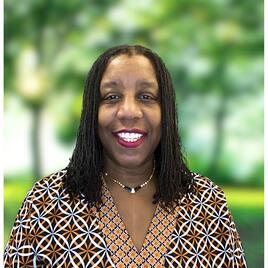
Career Specialist, Career Center
As a part of our "Why I'm First" campaign, please share what it meant for you to be a First Generation college student?
What it has meant to me is endless possibilities. College open doors to me that I would not have otherwise had the opportunity to walk through.
What challenges did you face as a First Gen student and what programs/people helped you overcome them?
At the colleges I attended, I was always one of the few BIPOC Students walking the halls so it was hard some times not to feel isolated. But I was able to connect to some amazing Mentors along the way that helped me navigate college life and to not feel so isolated. And one of my Mentors I am still in contact with to this day 40+ years later.
What UCR campus resources, programs or offices do you hope to see our First Gen students utilize?
Career Center, Cultural Centers, ARC just to name a few.
Liliana Aguila-Barajas
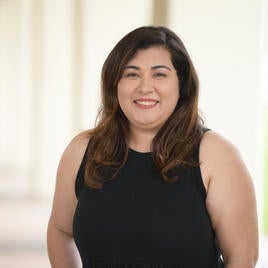
Senior Advising Coordinator- CNAS Undergraduate Academic Advising Center
As a part of our "Why I'm First" campaign, please share what it meant for you to be a First Generation college student?
Being a first generation college student meant I was paving the way for those in my family to come. I would have the knowledge and experience to guide others through the process.
What challenges did you face as a First Gen student and what programs/people helped you overcome them?
One of the challenges I faced was although I was not living at home I still had familial responsibilities and that sometimes took away time from studying or participating in certain events. I joined a student organization Hermanas Unidas and this helped me gain support from other students in similar situations and learn how to navigate the college culture.
What UCR campus resources, programs or offices do you hope to see our First Gen students utilize?
Academic Resource Center, Academic Advising, TRI Programs, Ethnic Affinity Centers
Mariana Jimenez Femat
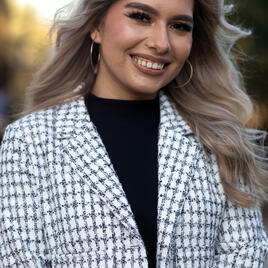
Academic Advisor, CNAS
As a part of our "Why I'm First" campaign, please share what it meant for you to be a First Generation college student?
I am first to make my parents proud and show them that all their sacrifices were greatly appreciated.
What challenges did you face as a First Gen student and what programs/people helped you overcome them?
Challenges I experienced as a first generation students include: Lack of knowledge of institutional policy, need for financial literacy, lack of career planning support. These challenges were addressed with the services and personal relationships formed via my institution's Education Opportunity Program, Academic Advising Center, Women's Resource Center, and Career Center.
What UCR campus resources, programs or offices do you hope to see our First Gen students utilize?
Academic Advising, Career Center, Health Professions Advising Center, Financial Aid, Office of Sustainability, Affinity Groups, UCR Library, The Well, Basic Needs Department, CARE
Noel Salunga
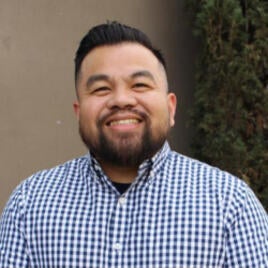
Assistant Director, Student Success Programs, College of Natural & Agricultural Sciences
As a part of our "Why I'm First" campaign, please share what it meant for you to be a First Generation college student?
First-Generation College Student = Trailblazer. You will be the first one in college to fail, make a mistake, go to office hours, stay in a dorm, take a midterm, take a final, be a leader of a student organization, participate in work-study, research in lab, and the first to cross to cross the graduation stage, throw your cap in the air!
What challenges did you face as a First Gen student and what programs/people helped you overcome them?
I wanted to drop-out the first day of orientation before class started. I wanted out, right when I started. I did not get the classes I wanted. Nobody sat next to me during orientation. All the answers I got was "no, not possible", "sorry we cannot get you in that class", doors were being shut. That day in the student resource fair, the Director of the Cross Cultural Center reached out to me to see how my day was going. I was able to connect with her for that moment and finally, I thought wow that is someone who cares.
What UCR campus resources, programs or offices do you hope to see our First Gen students utilize?
All of them. Specific to CNAS - Learning Communities, First Year & Transfer Success Programs, and Research in Science & Engineering.
Andrea Martinez Rodriguez
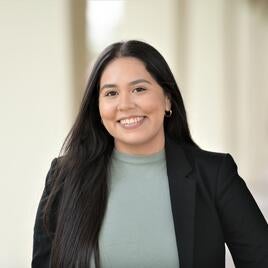
Intake Advisor at the CNAS Undergraduate Academic Advising Center
As a part of our "Why I'm First" campaign, please share what it meant for you to be a First Generation college student?
Being a first-generation college student, meant opportunity and resilience. I acknowledge that it was a privilege for me to have had the opportunity to pursue a Bachelor's degree and graduate from a UC. Being a first-generation college student, it opened many opportunities for me to navigate academic and professional spaces that have helped me grow personally and professionally. Additionally, it meant being resilient many times when faced with adversity and learning through trial and error. Being the oldest in my family and being a first-generation college student, it was important for me to pave a new path for my younger siblings and cousins; a path I could provide more knowledge of, support them in, and help them navigate through.
What challenges did you face as a First Gen student and what programs/people helped you overcome them?
As a first-generation student, a challenge I faced was accepting failure and rejection. Throughout my high school years, I had measured my value to my accomplishments and grades. It was very difficult for me to learn to accept failure as part of success and that my value is not determined by accomplishments and grades. I learned throughout my undergraduate career the importance of self-compassion and advocating for myself. Some of the organizations that helped me navigate being a first-generation student at UC Santa Barbara were Lambda Theta Alpha Latin Sorority, Inc., A.S. Student Initiated Recruitment and Retention Committee (SIRRC), Promise Scholarship Program, and my first-generation mentors, peers, and friends.
What UCR campus resources, programs or offices do you hope to see our First Gen students utilize?
I hope our first-generation students utilize the Academic Resource Center (ARC), Health Professions Advising Center (HPAC), Undocumented Student Programs (USP), their respective college's academic advising team, the Career Center, The Well, CAPS, and more!!
Arielle Shepherd
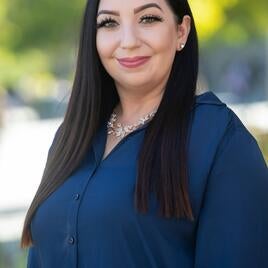
Academic Advisor; CNAS Undergraduate Academic Advising Center
As a part of our "Why I'm First" campaign, please share what it meant for you to be a First Generation college student?
Being a first generation college student empowered me to make a difference for my family and myself. I wanted to make my family proud and pave the way for my children in the future.
What challenges did you face as a First Gen student and what programs/people helped you overcome them?
I did not realize I was considered a first generation college student until I transferred to Cal Poly Pomona. I figured since my mom took a few courses at a community college, I wasn't considered a first generation student. I learned that since she did not earn a degree, I was considered a first generation college student. Since I was uneducated, I missed the opportunity to apply for special programs and services that could have supported me through my education. Through college, my family, friends, faculty, and mentors played a huge role in my success. There were many times that I wanted to quit, but they reminded me that my purpose outweighed all of the challenges.
What UCR campus resources, programs or offices do you hope to see our First Gen students utilize?
UCR Financial Aid, Kessler Scholars Program, First Generation Student Association, Ethnic and Gender Program Offices, Student Recreation Center, Academic Advising, The Career Center, The Well, CAPS, and Education Abroad.
Ashley Chrisakis
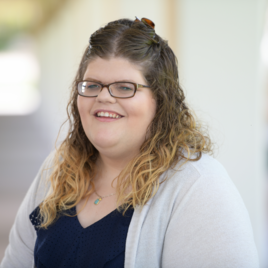
Advisor-HPAC
As a part of our "Why I'm First" campaign, please share what it meant for you to be a First Generation college student?
Even though at the beginning it was scary because there was a sense of, I have to do this alone and find my way, with the support of the campus I was on and the willingness to ask for help, it shaped me into a confident and knowledgeable individual. It also made me realize that I wanted to help college students in the future.
What challenges did you face as a First Gen student and what programs/people helped you overcome them?
The biggest challenge was learning the campus departments and learning how to ask for help. My advisor at the time and one of the faculty members I had for Sociology really helped guide me. I think being open and ready to learn was a good way to overcome most challenges.
What UCR campus resources, programs or offices do you hope to see our First Gen students utilize?
I hope the first gen students of UCR really take advantage of the resources they have here. It will make college more enjoyable. Resources such as the ARC, HPAC, The Well and more, all have open doors and are here to serve students.
Katina Napper
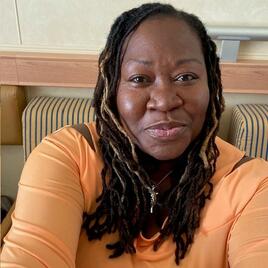
Assistant Vice Provost, Academic Personnel
As a part of our "Why I'm First" campaign, please share what it meant for you to be a First Generation college student?
As a first generation college student, I traveled a new path with my community supporting me every step of the way. In addition to navigating this new path, I was also navigating being cared for by a family outside of my community, who supported me in my pursuit of higher education. Being a first generation college student allowed me to have learning experiences and opportunities I would not have had, and to meet individuals from all over the world that expanded my possibilities. It also allowed me to make my community proud and contribute to the learning and expansion of possibilities for others.
What challenges did you face as a First Gen student and what programs/people helped you overcome them?
It was overwhelming to navigate this new space and I felt extreme pressure to do very well. So many people had made sacrifices and so many people were counting on me to do it, because to them it meant they could do it. I was physically away from the community that nurtured me and felt very alone. I was also dealing with family issues from a distance and the stress was high. I was very fortunate to have professors and staff members who had similar backgrounds take the time to connect and create a safe space for me and help me create community. I also chose to live on the floor with the other scholarship recipients and we are still friends today. The Black Student Programming at my University was also very vital to me.
What UCR campus resources, programs or offices do you hope to see our First Gen students utilize?
Please connect to the student programming offices that you identify with. There are so many resources for you. Focus on creating community. You are not alone. Connect to Faculty and Staff who are available to mentor, coach and connect you. Many of us work in Higher Education because helping students is very important to us no matter what department we work in. Also, have fun! Join a club of interest and be open to new experiences and new and different people. you are amazing! Give others the opportunity to experience that:-)
Angie Diaz
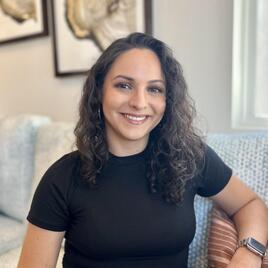
Assistant Coordinator, ARC
As a part of our "Why I'm First" campaign, please share what it meant for you to be a First Generation college student?
For me, being a first generation college student meant creating opportunities that didn't previously exist in my family. It meant becoming the representation I needed when I was younger, but it also meant being brave enough to navigate unchartered waters.
What challenges did you face as a First Gen student and what programs/people helped you overcome them?
I faced a lot of anxiety because my family did not understand the expectations a college student has, I had difficulty making friends and meeting others because I also commuted and felt like I did not know how to make the most of my college experience. Finding staff that came from similar cultural backgrounds as me that could help me navigate the tension with my family allowed me to overcome my obstacles.
What UCR campus resources, programs or offices do you hope to see our First Gen students utilize?
I hope to see more first gen students utilize the ARC.
Deborah Deas
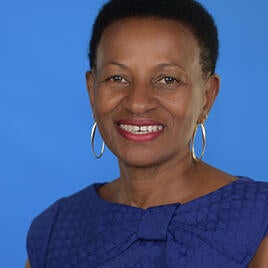
Vice Chancellor Health Sciences and Dean UCR School of Medicine
As a part of our "Why I'm First" campaign, please share what it meant for you to be a First Generation college student?
I stand on the shoulders of others who paved the way for me.
What challenges did you face as a First Gen student and what programs/people helped you overcome them?
I didn't have the general preparation for college therefore I sought mentoring (peer, staff and faculty) and resources from the education resource center.
What UCR campus resources, programs or offices do you hope to see our First Gen students utilize?
Student Success Center and Counseling and Psychological Center
Laura Riley
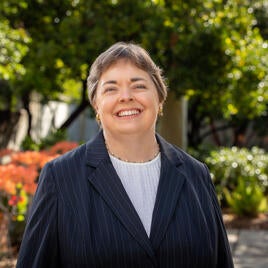
Director, Student Disability Resource Center
As a part of our "Why I'm First" campaign, please share what it meant for you to be a First Generation college student?
It meant having an education and opportunities that my parents and previous generations did not.
What challenges did you face as a First Gen student and what programs/people helped you overcome them?
Not knowing how college worked, understanding what resources were available, and finances where always a concern. I lived in the residence halls my first year and people there encouraged me to get involved not just there but elsewhere on campus. I also found tutoring resources that were available on campus and helped with my first year.
What UCR campus resources, programs or offices do you hope to see our First Gen students utilize?
I don't want them to get overwhelmed, but I do hope they explore what is available and be proactive in learning about resources that can help them at different times, whether they are struggling with something or just want to connect and get involved. It is going to be different for different students. The campus feels much smaller for students when they are involved.
Maria Keller
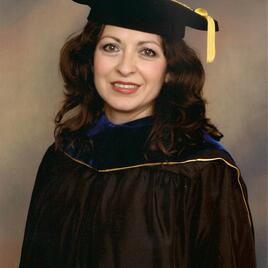
Associate Director, Student Disability Resource Center
As a part of our "Why I'm First" campaign, please share what it meant for you to be a First Generation college student?
Pride
What challenges did you face as a First Gen student and what programs/people helped you overcome them?
did not know about financial aid, majors, what was graduate school, felt that I should know, so I was nervous about asking for help. What helped: McNairs program (part of the TRIO Programs), talking to faculty in classes I enjoyed and was good at, talking to other students, staff who worked at student centers where I could just hang out because they were welcoming.
What UCR campus resources, programs or offices do you hope to see our First Gen students utilize?
SDRC, TRIO Programs, Book assistance programs, Career center -internship opportunities, graduate school information, financial aid literacy, how to apply to scholarships, ARC
Jonathan Sistona
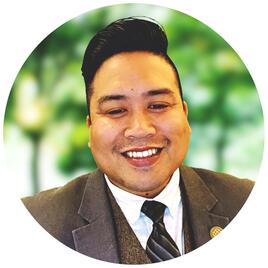
Industry Outreach Specialist
As a part of our "Why I'm First" campaign, please share what it meant for you to be a First Generation college student?
For me, it meant that I am a product of my family's dreams. It meant that all the hard work and sacrifice that my family endured had paid off because it afforded me the freedom and drive to actualize my own dreams through education.
What challenges did you face as a First Gen student and what programs/people helped you overcome them?
Since I left my home city of LA to go to college in Iowa, much of my challenges stemmed from the cultural shock of moving to such a remote part of America coupled with the pressure of being viewed as an "affirmative action" student. Consequently, this lead to a feeling of imposter syndrome and deep insecurity over my own academic capabilities. Engaging in communities that focused on positive outlets was my main form of coping. In those communities I found like-minded and open people. I engaged in community service groups, participated in cross-country community service trips/programs, and spent plenty of time engaging with cultural based groups as well.
What UCR campus resources, programs or offices do you hope to see our First Gen students utilize?
I hope for them to utilize everything the Career Center has to offer. We are more than just info sessions and newsletters. We do our very best to provide in depth training, services, and programs completely geared towards helping you forge your own career path. Do not wait till your senior year to see us, come early and come often!
Emma Simmons

Associate Dean Student Affairs
As a part of our "Why I'm First" campaign, please share what it meant for you to be a First Generation college student?
It means that you willave to fight harder and longer but the winning is that much sweeter. Work hard, hold your head up and be proud of everything that you accomplish. Don't ever give up
What challenges did you face as a First Gen student and what programs/people helped you overcome them?
Not being aware of what was expected of me and what I could do to have a competitive edge
What UCR campus resources, programs or offices do you hope to see our First Gen students utilize?
anything that is available to them that will help in their academic pursuit!!!! Use the tutor always and ALWAYS ASK FOR HELP
Austin Johnson
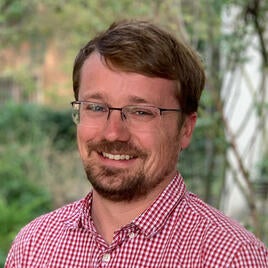
Associate Dean of Undergraduate Education, Associate Professor, SOE
As a part of our "Why I'm First" campaign, please share what it meant for you to be a First Generation college student?
Being a First Generation college student is one of the biggest reasons I take mentoring and being available to students so seriously. Systems of higher education are historically so challenging to navigate without someone who's had that experience telling you what to expect and what to consider. That knowledge can't be kept a secret if we genuinely care about equity and caring for others.
What challenges did you face as a First Gen student and what programs/people helped you overcome them?
I just wasn't talking about college a lot when I was in high school. I knew I would go, but I didn't have a clear plan of how to get there or what I wanted to look for in a school. I did a couple campus visits with my dad, which was great, but I hardly did any extracurriculars in high school and my applications weren't particularly competitive. I ended up leaving my hometown of Tucson for a small public university in rural Missouri because they gave me the most money in financial aid. It was tough. I was struggling with depression and anxiety, isolated myself from my friends, didn't reach out for help, and decided I was dropping out about halfway through my first semester. After getting back home to Tucson, I worked at a call center for a while and then decided to enroll at the University of Arizona. I connected with friends again, starting getting help for my mental health, and things got a lot better.
What UCR campus resources, programs or offices do you hope to see our First Gen students utilize?
All of them! When I was an undergrad, I was convinced there was nothing that my university could offer me that would help me figure these systems or myself out. Now that I'm on the inside and I understand how much exists to support students, and how genuinely staff care about helping students succeed, I know I could have had a much different experience if I had just tried a little bit harder to make those connections. Anxiety is tricky that way! It made me convinced that asking for help was a burden on others, that people would think I was dumb or weak, and really I was just fundamentally scared to talk to people a lot of the time. Things didn't have to be that hard; so many people are kind and want to help. You just have to ask for it.
Pat Johnson
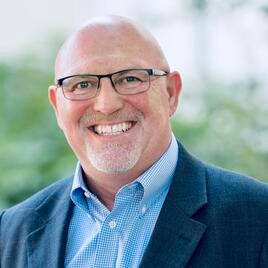
Supervisor in Teacher Education & Single-Subject Program Coordinator in Teacher Education Program
As a part of our "Why I'm First" campaign, please share what it meant for you to be a First Generation college student?
In the fall of 1980 I broke the cycle of my immediate family and all previous relatives on both of my parents side of the family to attend college or university. I earned my Bachelors degree in 1984. This led to one of my siblings following in my footsteps and both our children have college degrees.
What challenges did you face as a First Gen student and what programs/people helped you overcome them?
Like many or perhaps all of our "First Gen" students, my family didn't know or understand what I was going into. I recall completing FASFA was a nightmare for my parents and I. Fortunately, many at my local high school and then again at the college helped me navigate financial assistance, registering for courses, housing, etc. I would say my teammates and coach in the wrestling program is where I learned where to go and who to see to navigate my first year of college. After that my professors and/or instructors were there to support me and help me face th challenges of navigating the college environment.
Yvette Hayes
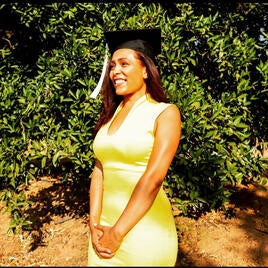
Academic Counselor
As a part of our "Why I'm First" campaign, please share what it meant for you to be a First Generation college student?
Being a first generation college student for me meant that I was going to undertake the challenge of enrolling and finishing college without having the needed guidance or blueprint. However it also meant that by no means necessary was I ever going to give up or succumb to the ongoing and incessant obstacles that continued to come my way year after year. I was a first generation lower income student so that my son does not have to be and so that I can provide a better life for my family.
What challenges did you face as a First Gen student and what programs/people helped you overcome them?
I faced a wide range of obstacle including housing , food insecurity, financial instability and lack of childcare. The other part was the mental an emotional toll that weighs very heavy as a first generation, lower income, transfer single parent, there was always a challenge. I used my resources starting with the transfers first program which gave me mentorship and helped me understand the layout of the campus. I used the basic needs department and R' Panrty/the Well for food resources and questions regarding housing. I used the ARC to help me as a student with writing assignments and the career center to help get an understanding of what I could do with my degree, how to job search and practice interviewing. The Women's resource center and the African student programs office is where I went to build and feel community, I also took advantage of all of the wonderful programming they put on at that time. More than anything it was the staff, about 5 individuals from different offices that I grew very close with and provided mentorship that ultimately would give me opportunities that led me to my current role Their support and encouragement is why I went into Grad school when I did not believe in myself.
What UCR campus resources, programs or offices do you hope to see our First Gen students utilize?
I hope they utilize the basic needs office, the well, the library, career center ,the ARC and whatever ethnic gender office they identify with. I hope they also utilize the transfers 1st program if they are also transfer students. I hope they find a mentorship program that works for them, that was very helpful.
Wesley Sims
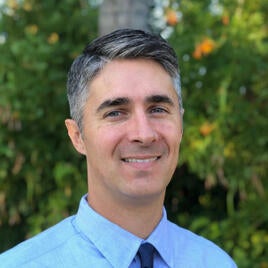
Assistant Professor, School of Education
As a part of our "Why I'm First" campaign, please share what it meant for you to be a First Generation college student?
Simply, pride. I took pride in my personal accomplishment and my family was equally proud of me.
What challenges did you face as a First Gen student and what programs/people helped you overcome them?
The biggest challenges were related to paying for college. Beyond paying for actual tuition, it was difficult to balance my studies with working full time to pay rent, bills, etc. Sadly, I only recall student loan programs and the financial aid office on campus.
What UCR campus resources, programs or offices do you hope to see our First Gen students utilize?
The SOE has a transfer seminar that connects students to campus resources like the R’Pantry, writing services, counseling
Rena Roberts
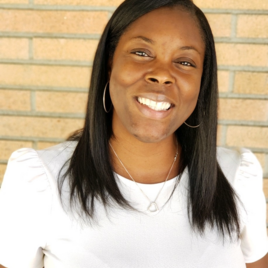
Director, Academic Resource Center
As a part of our "Why I'm First" campaign, please share what it meant for you to be a First Generation college student?
I didn't think about being a first-generation college student while I was in college. As an undergraduate student, I was honestly just trying to make sure that I graduated. It wasn't until after I graduated that I realized how much of a big deal it was to be the first person in my family to graduate from college.
What challenges did you face as a First Gen student and what programs/people helped you overcome them?
I don't know that the challenges I experienced in college were directly related to being a first-generation college student. I think part of me not feeling like I experienced challenges directly related to being a first-generation college student is that most of the friends I met were also the first in their families to go to college. I relied a lot on my peer group in college. They really helped me through some difficult times. Staff members on campus also supported me. My financial aid counselor, my supervisors at my on campus jobs, were all really helpful.
What UCR campus resources, programs or offices do you hope to see our First Gen students utilize?
I hope students utilize the Academic Resource Center (ARC), their academic advising offices, and Counseling and Psychological Services (CAPS).
Thomas Kramer
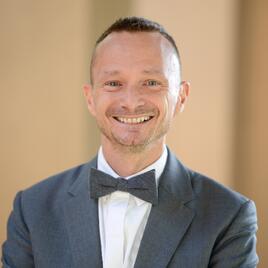
Associate Dean of Undergrad Programs & Professor of Marketing, School of Business
As a part of our "Why I'm First" campaign, please share what it meant for you to be a First Generation college student?
It was transformational not just for me but for my whole family. Although being the fist involved pressure to succeed, it also made my family immensely proud that I not only went for an undergraduate degree but then followed it up with an MBA and a PhD
What challenges did you face as a First Gen student and what programs/people helped you overcome them?
Being the first always involves some pressure to succeed so as not to let people down. Part of that also means being held up as a "role model" for others to follow. What helped was the support from my friends at school, many of them were also First Generation. My undergraduate degree was at Baruch College / CUNY, a highly diverse university with a large First Gen student population.
Mindy Truong
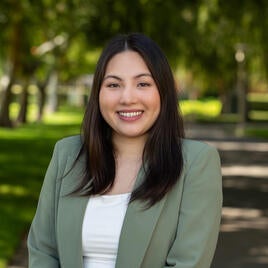
Assistant Professor; School of Business
As a part of our "Why I'm First" campaign, please share what it meant for you to be a First Generation college student?
For me, being a first-generation college student meant drawing on the resilience and resourcefulness instilled in me by my family to navigate unfamiliar challenges and experiences.
What challenges did you face as a First Gen student and what programs/people helped you overcome them?
One challenge I encountered was navigating the unwritten rules of academia. However, I was fortunate to have supportive mentors who played a crucial role in guiding me through them. Joining the psychology honors program was the turning point that changed the course of my life. It opened doors to opportunities and initiated a chain reaction of mentorship and connections.
What UCR campus resources, programs or offices do you hope to see our First Gen students utilize?
I hope to see students actively engaged in undergraduate research and mentorship programs as they are instrumental to academic growth and building meaningful connections. Success is not something you can achieve alone.
Paul Perez
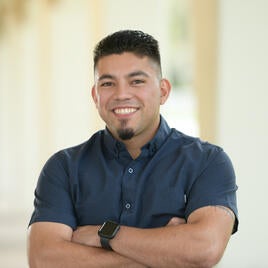
Academic Advisor for CNAS UAAC
As a part of our "Why I'm First" campaign, please share what it meant for you to be a First Generation college student?
Being a First Generation student meant that I was meant for more than just working in construction. Being the first to go to college meant that I was destined to have access to more opportunities and that I was not limited by the social boundaries.
What challenges did you face as a First Gen student and what programs/people helped you overcome them?
I faced challenges such as: Imposter syndrome, depression, lack of motivation, false narrative, guilt, etc. The programs that helped me overcome this was the Educational Opportunity Program on my campus. I always benefited a lot by join clubs and organizations with people who looked like me and shared common cultural/beliefs as me. An example of an organization that I am still very connected with is a Latino Fraternity that I joined called Gamma Zeta Alpha.
What UCR campus resources, programs or offices do you hope to see our First Gen students utilize?
I hope students utilize the career center, HPAC, and their Professors Office Hours and Major Advisors.
Kathryn Uhrich
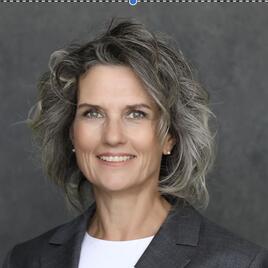
Professor, Chemistry
As a part of our "Why I'm First" campaign, please share what it meant for you to be a First Generation college student?
It meant that I had to learn many things myself - like how to even apply to college
What challenges did you face as a First Gen student and what programs/people helped you overcome them?
I'm embarrassed by the number of challenges that I faced. I thought I was smart, but I just didn't know what questions to ask.
What UCR campus resources, programs or offices do you hope to see our First Gen students utilize?
Faculty
Helen Regan
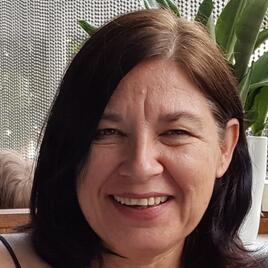
Professor, Evolution, Ecology, and Organismal Biology
As a part of our "Why I'm First" campaign, please share what it meant for you to be a First Generation college student?
It meant social and economic mobility, a greater choice of professions, a level of financial security and freedom that my parents were not able to experience, a broadening of ideas and perspectives, and a demonstrated path towards a college degree that my younger sister could also pursue.
What challenges did you face as a First Gen student and what programs/people helped you overcome them?
I found it very hard to juggle my studies and a job. I had no idea that an education could be pursued just for the joy and interest in academic inquiry - it was viewed as getting training for a job. This meant that I took classes that I was not well suited for and did not succeed in. In the end I had to take a long break from college to re-evaluate my interests, values, and why I wanted a degree. I still had to juggle studies and a job which was hard but I was a lot more motivated and inspired to succeed when I returned to college.
What UCR campus resources, programs or offices do you hope to see our First Gen students utilize?
I think UCR offers a lot of really great programs to help First Gen students succeed. The summer research programs in particular are fantastic opportunities for students to gain confidence and independence in scholarly work. I think more of our students should utilize faculty office hours and get to know faculty better. Many of us went through the same struggles as our students are going through. I've failed courses and had to change my major to something I enjoyed a lot more - it's not the end of the world.
Flip Tanedo
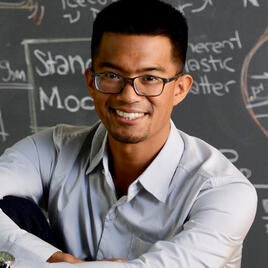
Associate Professor in Physics & Astronomy
As a part of our "Why I'm First" campaign, please share what it meant for you to be a First Generation college student?
Being a first generation college student meant not having the cultural knowledge of how to navigate the "unwritten syllabus" of how to succeed in a university. However, it was also a "superpower" in that it allowed me to seek opportunities in a way that was not limited by preconceptions.
What challenges did you face as a First Gen student and what programs/people helped you overcome them?
In my case, being a first gen college student intersected with being a second generation American (the child of immigrants). I would find myself in exciting new experiences—like spending a summer doing research in a national lab—and would struggle to find ways to explain to my parents what I was doing. They would ask me the only questions they were equipped to ask, for example: were there other Filipino people in the lab? I struggled answering these: I was the only person who looked like me in my program and in the research buildings, but there were plenty of Filipino employees of the lab: custodial staff, food service workers, and groundskeepers. These are honorable jobs and those individuals were part of the lab community, but they were simply not part of the research component that was the raison d'être of the lab. It was a jarring realization that would hang over me when I felt challenged by my work. For example, a challenging exam could make any student feel discouraged. But for me, it was a reminder that maybe I didn't have the talent for research and that I belonged with the rest of "my tribe" in non-academic spaces.
I would eventually find encouragement in communities of other first-gen students, immigrants, non-traditional academics, and international colleagues. Even though our paths are very different, there are countless ways in which academia can challenge you in a way that makes you question your belonging. We were able to recognize that common experience and find strength in each other's resilience.
What UCR campus resources, programs or offices do you hope to see our First Gen students utilize?
Think of the departments and programs that you spend most of your time in. With time and effort, you will find a community in those spaces. What I recommend is to take some time to break out of those spaces and extend your sense of community. If you spend a lot of time in your STEM field, find a way to be part of spaces that are predominantly humanities. If you are naturally bookish, find a group activity in the rec center. One of the most magical features of a university is the diversity of life and scholarship that it brings together. It is a unique experience that is hard to find elsewhere. Not only will this broader community help you find belonging, it will enrich your experience and make you realize how special it is that you belong in a community like ours.
Kevin Freedman
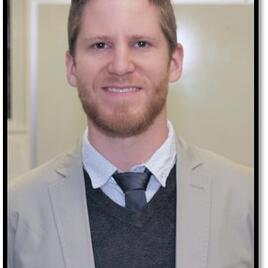
Assistant Professor, Bioengineering
As a part of our "Why I'm First" campaign, please share what it meant for you to be a First Generation college student?
Coming from a family of manual laborers, it felt great to break the cycle and create a new path that hopefully will inspire my children to seek higher education.
What challenges did you face as a First Gen student and what programs/people helped you overcome them?
Low income was the major challenge, however my family supported me and instilled in me the right values to make the necessary sacrifices.
What UCR campus resources, programs or offices do you hope to see our First Gen students utilize?
International programs: traveling the world made me dream big. Scholarship Writing Resources: Having a prestigious award helps build confidence and seek bigger dreams.
Len Nunney

Prof. of Grad Division, EEOB
As a part of our "Why I'm First" campaign, please share what it meant for you to be a First Generation college student?
It gave me the freedom to choose the career that I really wanted
What challenges did you face as a First Gen student and what programs/people helped you overcome them?
Financial - but I received a small government grant that made all the difference
What UCR campus resources, programs or offices do you hope to see our First Gen students utilize?
Enjoy the opportunities for new experiences that UCR provides
William Neary
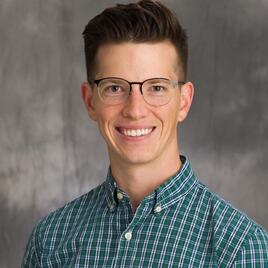
Assistant Professor in Chemistry
As a part of our "Why I'm First" campaign, please share what it meant for you to be a First Generation college student?
The sacrifices of my parents were warranted. Their hardships allowed me to focus on my education and helped me reach where I am today.
Stephen Kane
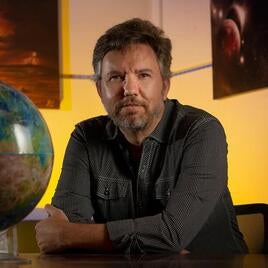
Professor, Earth and Planetary Sciences
As a part of our "Why I'm First" campaign, please share what it meant for you to be a First Generation college student?
Being a First Generation college student means I was able to follow my dream and study a subject that I was truly passionate about.
What challenges did you face as a First Gen student and what programs/people helped you overcome them?
I come from a fiercely working class family that were very strongly opposed to my attending college. It was the support of teachers and friends that enabled me to push through these obstacles.
What UCR campus resources, programs or offices do you hope to see our First Gen students utilize?
I hope First Gen students make use of the undergraduate research portal to help them explore where their passion lies (or doesn't lie)
Simon Groen

Assistant Professor in Nematology
As a part of our "Why I'm First" campaign, please share what it meant for you to be a First Generation college student?
Attending college felt empowering
What challenges did you face as a First Gen student and what programs/people helped you overcome them?
Fellow students helped me overcome my lack of prior knowledge of what life as a college student would be like
Brandon Brown
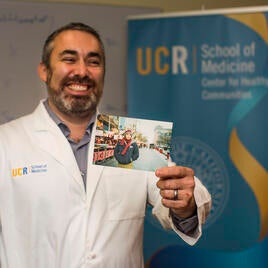
Assistant Professor, School of Medicine
"It was pretty clear when I was applying that I had no idea what I was doing. And it was kind of scary because you have to figure that stuff out and you don’t really know what they want to hear when you’re on the other side, doing your essay and all this stuff. And definitely, once you actually start it's different too. College is hard. It’s a lot harder than high school. So, to figure that part out you have to be independent in going to class, making sure you’re on time, actually putting time away for studying.
My advice for First-Gen students is to quickly identify a person who knows how things work, and they need to give advice and keep you focused. Because it helps to have a person who’s willing to care enough to tell you if you’re not doing things right. If you listen then you can succeed. [All it takes is one person] to believe in you. It’s harder to listen to your parents. If someone outside who doesn’t really know your history, says that they believe in you, then it’s really powerful."
Sharon Oselin
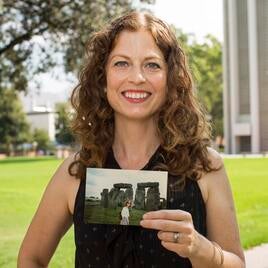
Assistant Professor, Sociology
“One thing I struggled with initially was I didn’t really know what I wanted to do in terms of my major. I had a lot of anxiety about that! I switched majors a lot. I had this fantasy that I was going to be a doctor – a medical doctor. I am a doctor now, but I had no idea I wanted to be a professor. That idea never crossed my mind, especially coming from a household like I did. I think the first two years especially are the time to try different courses and get exposed to different disciplines and not necessarily rush into a major.”
Carole Anne Tyler
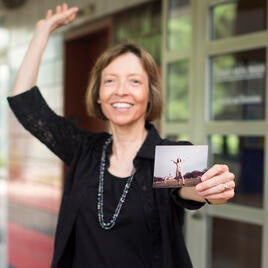
Assistant Professor of English
"One of my very first classes was French. It met at 8:00 a.m., and my teacher asked how many of us had been to France. Everyone in the room but me raised a hand. I never talked in class because of that. I thought my classmates really knew the language and culture because they'd been to France. Meanwhile, I had a perfect score on the national achievement exam in French and all A's in my high school French classes. It never occurred to me that my classmates had probably gone with mom and dad on a two-week vacation to France, which hardly made them experts. I allowed myself to be intimidated because they had actually been there and I hadn't and I didn't have another perspective on what their travel might mean. The wonderful thing about college is it’s a chance to learn in a very broad way. Don’t think of it as just about developing vocational skills. It allows you to explore things that might become a source of great joy and pleasure in life that have nothing to do with the world of work--art, literature, athletics. So much of what is rewarding in life happens outside work--though sometimes an extracurricular activity turns out to be what catches an employer’s eye on a resume! Think of college as a way to make yourself a better citizen and person, to prepare for life and not just work. My biggest message is that students shouldn't be afraid to be vulnerable and admit they have something to learn. Trying new things includes finding faculty mentors. Don’t be afraid to say to faculty, "I don’t understand why I’m not doing better in the course. I always did well in high school. Can you help me improve?" Faculty want to help and can often advise not just about classwork but graduate school and job application materials, study and travel abroad, time management and work-life balance, and other things. I wish I had found some faculty mentors early on because I might have had a difference experience in college, not just in French but in some other classes and some of my extracurricular activities too."
Paul Larsen
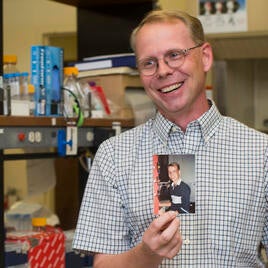
Professor of Biochemistry
"First gen does not know race or gender and is a community made up of students from all backgrounds that through no choice of their own become part of it. The first gen label is not something that should limit the members of our community but rather is a symbol of our inner drive to be successful in spite of not having the same starting line as our peers. As a first-generation college student, I did not come from a home where higher education was something anyone knew about. Growing up in Michigan, I thought that once you graduate from high school you were off to a career as a blue-collar worker in the automotive industry. Because people saw in me things that I didn’t see myself and because they believed in me, I ended up being recruited to go to college even though I was unaware of what any of that meant. Because of that, I took my ACT exam and the scores came back and said that I would be a good biologist. I said ok, I guess I will be a biologist even though I had no idea what that entailed or to where it would lead me. When I got to college, I was so naïve that I didn’t even know the difference between a BA and a BS and never had heard of a Ph.D. In hindsight, it was helpful that I understood that while some of my peers knew that they wanted to be scientists since they were very young, me figuring this out at a later stage did not preclude me from being successful. I was perilously close to not making it through my freshman year largely because I was unaware about how to be successful in college, especially in Chemistry since I never had this course in high school. I ended up being fortunate enough to have a Biochemistry professor take me under his wing. The college had implemented a remedial Chemistry course for people in my situation. I look back and realize that’s the only reason I’m in science today because without it I would not have been successful in my major. It’s frightening but also inspiring at the same time to see reflectively how much of an edge we’re on in terms of whether or not we are successful. It was a pivotal moment in my life, to where if that professor had not taken me in and mentored me, I would not have survived in that program. It’s one of those things where you look back and say, “Wow! It’s really scary how close I came to failing”. But because that one person took care of me, I made it to the level of Full Professor in the University of California system. To me, that is a huge black and white difference- that one moment was sink or swim. My best advice to students is to be open minded when beginning their college careers. It is hard to expect an 18-year-old student to be precocious enough to be able to know for certain what career they want to be part of for possibly the rest of their life. College is a bit like getting ice cream at Baskin Robbins- there’s a lot of different flavors here from which to choose and it’s up to you to decide what you like by being willing to try different things. Just because it seems that everyone else is happy with vanilla, chocolate or strawberry doesn’t mean that you won’t like something else better. The same is true for majors and careers."
Nicolas Barth
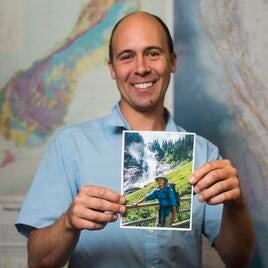
Assistant Professor of Geology
"One of the things that was important from me as an undergrad, and probably one of the main reasons I am actually here, is I took advantage of the education abroad program as an undergrad at UC Santa Barbara. That allowed me to go to New Zealand for a year, where I got to learn a whole new world of geology. It was so helpful and I was able to interact with world experts in things I was really interested in. Several years down the line, that ended up being where I did my PhD, was the same school because they knew me as a student. Some people have families and education abroad might not be a totally viable option. But that said, there are internships available in the local Inland Empire area that they can take advantage of if they just sought out what those opportunities are. Advice I would give to first-generation students is to find mentorships with a professor or try to work with them in their labs. Senior thesis and internships, education abroad - all those things give you a leg up. So, it would be great to see the first-generation students taking advantage of those more than the rest of the student population."
Steven Eulenberg
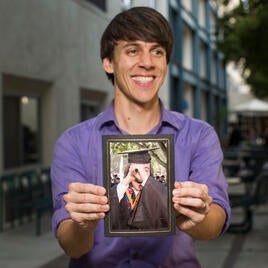
Coordinator of International Student Studies
"College was kind of this abstract idea when I was growing up that I never really thought about. Neither of my parents went to college. It wasn’t until I got to high school and had friends whose parents had gone to college, and who were talking about to going to college, that I felt like, “wow I’m way behind the curveball on this.” (Beginning college) was a weird experience. I had never had communal living experiences or anything like that. That was definitely kind of a shock. My parents and I had to learn about the basic things I needed. We realized I needed to get special sheets and blankets, we had no idea what a twin XL bed was. I needed flip flops because I wasn’t going to go walk in barefoot to this public shower room. All those little things that you don’t really know about until you get here. Now I see a lot of the same things working with International Students. Most of them come from backgrounds where their parents went to university, but they realize that university in the U.S. is very different from university in China, or Italy, or Brazil. So, it’s a lot of the same challenges, trying to understand how to navigate this big university setting. I can relate to them, even if I’m not from another country, and it gives me better insight in helping them succeed."
Eve Higby
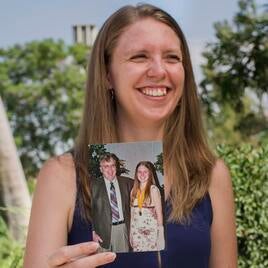
Post-Doctoral Scholar, Psychology
"I always tell my students to volunteer in labs, because no one told me about that as an undergrad, and I would have loved the opportunity."
Sandra Martinez
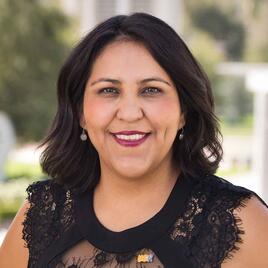
Editor/Writer, Inside UCR
"I would tell my freshman self to be less scared and less intimidated. Step out of your comfort zone. Don’t be afraid to fail. Join study groups. Visit your career counselor often and discuss options for your career. Envision your future. Don’t be afraid to dream big. Don’t underestimate your capabilities, your skills, your culture. The best thing about my college experience was everything — although, in retrospect, I feel I limited myself and was overly cautious, which kept me away from exploring college to the fullest. For example, I decided to study abroad in Mexico during my senior year. If I hadn’t been so timid about expanding my horizons, I know I would have studied in at least two countries."